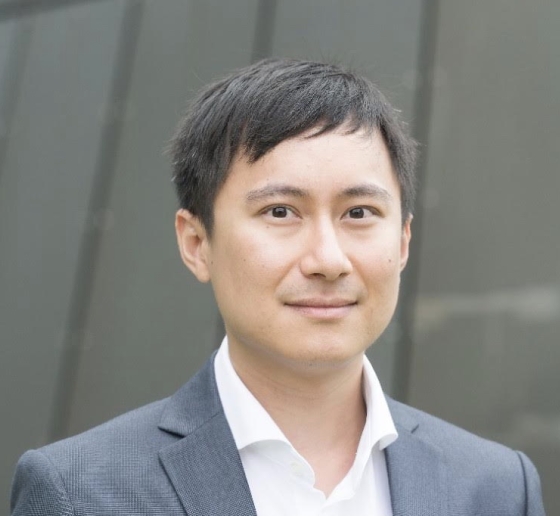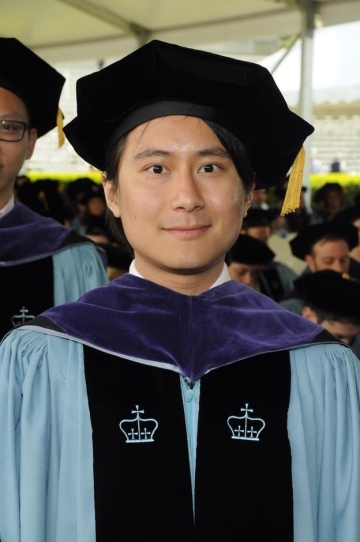A Career Propelled by Columbia Law School’s Graduate Degree Programs: Ben Chen ’16 LL.M., ’19 J.S.D.
The Australian lawyer wanted a career in academia. As a student in Columbia Law’s J.S.D. program, he produced original scholarship on elder abuse and inheritance disputes that paved the way to a tenured position at the University of Sydney Law School.

Ben Chen ’16 LL.M., ’19 J.S.D. was already a lawyer pursuing a Ph.D. in economics in Australia when he came to the United States to get an LL.M. at Columbia Law School. “I was particularly interested in some areas of American law where the U.S. is considered a leading jurisdiction, such as contracts, bankruptcy, insolvency, and remedies,” says Chen, now a tenured senior research fellow at the University of Sydney Law School. “And Columbia is one of the strongest faculties in private law, especially in terms of empirical and law-and-economics approaches.”
In the first semester of his LL.M. year, Chen took a course on children and the law with Elizabeth Scott, Harold R. Medina Professor Emerita of Law; she was in the midst of drafting the American Law Institute (ALI) Restatement of the Law on Children and the Law as its chief reporter and incorporated that work in her teaching. “Professor Scott had a huge impact on my thinking,” says Chen. “I thought the course was fascinating, and I went on to become a research assistant for her.”
Chen recalls also loving the bankruptcy course he took with Edward R. Morrison, Charles Evans Gerber Professor of Law. “I sat in the front row of his class, and he used to question me when he used the Socratic method, and I really enjoyed that,” says Chen.
During his second semester as an LL.M. student, Chen applied to the J.S.D. program to advance his academic career. He says working for Scott helped him demonstrate that he had the intellectual passion and discipline to be a J.S.D. candidate. “I think her letter of recommendation was the most important consideration in my getting into the program,” he says.
J.S.D. candidates are in residence at the Law School for a minimum of one academic year and a maximum of two years, devoting themselves to full-time study and research. After their residence, they are free to pursue other commitments anywhere in the world, but they must successfully defend and deposit their dissertation with the university within six years. Candidates have an advisory committee that consists of three full-time Law School faculty members.
In his application, Chen outlined his interest in applying a law-and-economics approach to exploring the concept of mental capacity and the elderly vis-à-vis disputes over inheritance. “It’s quite important lately because the United States, Australia, and many other countries have aging populations, and a huge amount of wealth is being transferred from baby boomers to the next generation,” he says. “As such, there has been a huge increase in disputes in court over inheritance and near-death transactions such as gifts and contracts. I thought the courts were not doing a consistently great job in resolving these disputes, so I thought, OK, I’ll have a crack and follow my curiosity.”
J.S.D. candidates can either write one unified work or a series of three articles. Chen chose the latter: “Given the reality of getting a job in the academy, articles tend to be the best way to express one’s arguments,” he says.
“Columbia is one of the strongest faculties in private law, especially in terms of empirical and law-and-economics approaches.”
Chen remained in New York for 18 months as a Columbia Law Herman N. Finkelstein Memorial Fellow, and he also continued to work as a research assistant for Scott. (They co-wrote a chapter, “Fiduciary Principles in Family Law,” for the Oxford Handbook of Fiduciary Law.) But when he was offered a position to teach at the University of Sydney Law School, he returned to Australia, where he completed his three articles.
When Chen presented the articles for his J.S.D. oral defense in New York in 2019, he thought he was going to fail because the examiners’ questions seemed so critical. “But they were really offering me feedback to help me with publication, and, of course, one has to be quite critical to give good feedback,” he says.
All three of Chen’s J.S.D. articles were subsequently published: “Elder Financial Abuse: Fiduciary Law and Economics” in the Notre Dame Journal of Law, Ethics & Public Policy (2020); “Family Fiduciaries in the Protective Jurisdiction,” in the Melbourne University Law Review (2020); and “Elder Financial Abuse: Capacity Law and Economics,” in the Cornell Law Review (2021). All three articles, he says, were instrumental in his being awarded tenure in 2022. “In particular, publication in the Cornell Law Review has been recognized as a big deal here in Australia,” he says. “Even far, far away from the United States, everyone knows the high quality of certain American law reviews.”
Now a full-time professor, Chen teaches courses on contracts, trusts, and conflict of laws, and he continues his research on inheritance disputes. He says one reason there is an increasing number of disputes is that “increasingly, you have people with multiple marriages and kids from multiple marriages, and you’ll see that most inheritance disputes are between siblings from different marriages,” he says. “Or the kids from the first marriage sue the spouse from the second marriage. These are relatively recent phenomena that seem to affect people in many countries.”
Chen is still in the early stages of research on how to reduce costs and delay in these disputes. He recently received a grant from the Australian government to conduct a behavioral economic analysis of inheritance litigation. “A typical inheritance dispute consumes more than one quarter of an estate,” he says. “And inheritance-related cases are now 20 percent of our state Supreme Court’s civil caseload, which, of course, taxpayers subsidize.”
What is Chen’s advice for lawyers thinking about pursuing a J.S.D.? “Don’t underestimate how much work is required, especially if you are working full time,” he says. “You need a significant amount of time for independent research, as there was in my case. If passion and curiosity are sufficient to motivate you to work hard, then I think getting a J.S.D. can be a great idea.”
The part of the J.S.D. program that Chen missed was graduation. “It was around the time of the examination period here in Australia, and I couldn’t get out of marking duty,” he says. “I would have loved to be there, and my mom would have loved it, too!”
